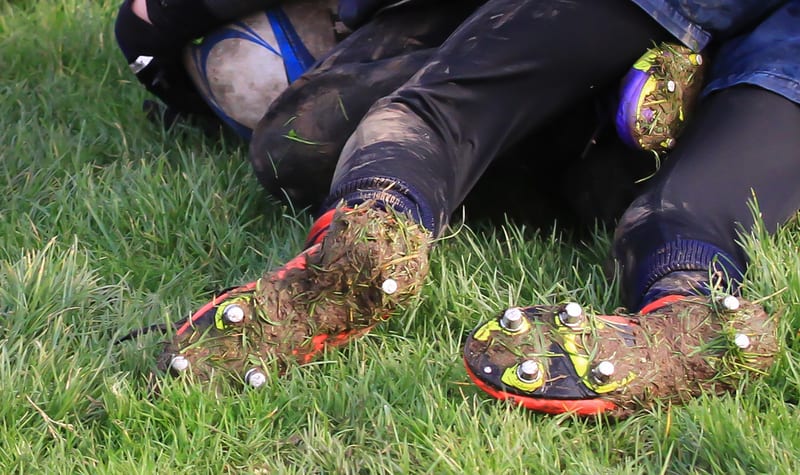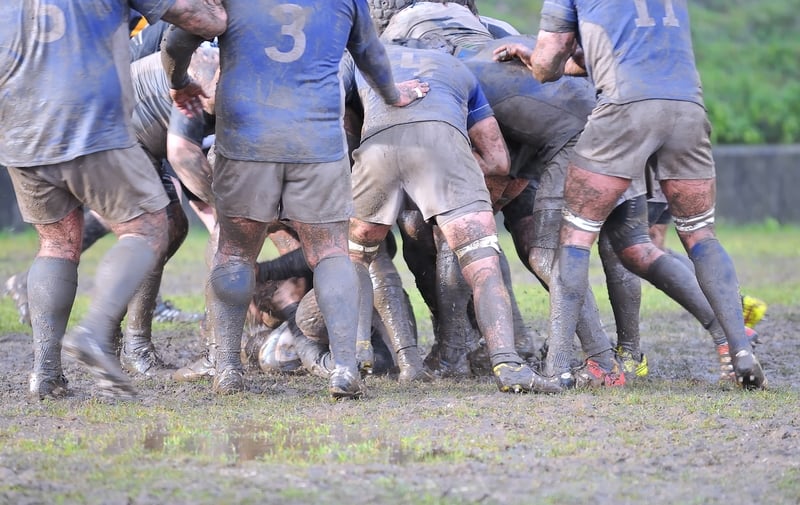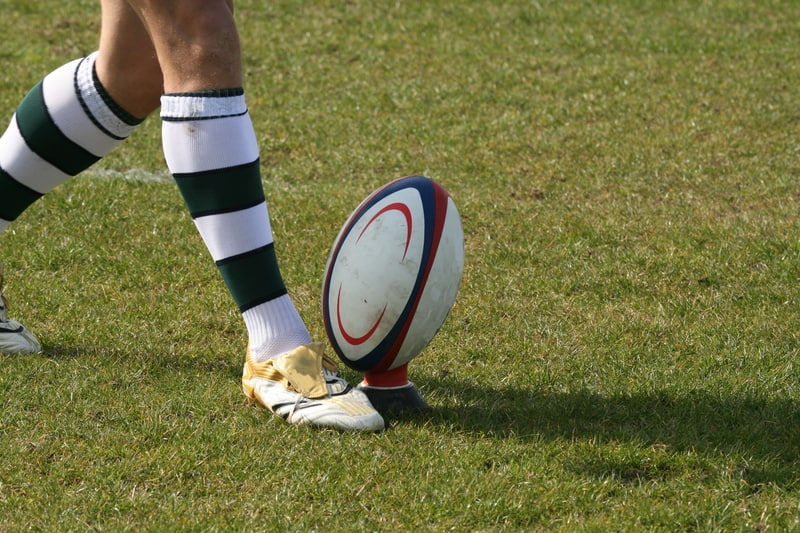
Playing rugby in the wrong type of boot will hinder your performance. Aching feet and the added complication of a boot that won’t give you enough grip, because it isn’t cut out for the ground it’s being worn on. It doesn’t sound like much fun, does it? So it’s important to know what type of rugby boot you need for the surface you’re going to be playing on.
FG rugby boots are used on pitches with short grass and firm ground. They have blades or moulded studs (sometimes a combination of both) made from plastic or hardened rubber. SG rugby boots are worn on softer pitches. The soleplate of an SG boot takes longer, screw-in metal studs in either six or eight stud configurations.
Now let’s delve a little deeper into the differences between these two types of rugby boot. With an average retail price of around $45 – $385, you’re going to want to be confident that whatever surface you’re playing on, you’ve got the right pair of boots on your feet.
Firm ground vs soft ground – which boot should I get?
Soft ground rugby boots

SG rugby boots are designed for use on softer ground in wetter conditions. The longer metal studs will penetrate further into a soft natural surface. This will ultimately give you more grip, meaning that you won’t end up on the deck every time you try to side-step a defender, change direction at pace, or hold your ground in a scrum, ruck or maul.
The studs screw into the soleplate of the boot, making them interchangeable and replaceable. SG rugby boots normally have configurations of 6 or 8 studs depending on the make or model in question.
The 8 stud configuration is more suited to playing as a forward because your feet will have a much greater purchase on the ground in scrums, rucks and mauls.
If you’re playing as a back, then you’re probably going to get on better with the 6 stud formation. You’ll be carrying less weight underfoot, which will increase your speed.
The reduced number of studs in a soft ground boot spreads the weight of your feet across fewer points, putting more weight on each individual stud. This and the fact that the stud is longer, ensures they sink further into the ground, improving both stability and traction.
A soft ground rugby boot is going to cost you somewhere between $55 – $355 (£45 – £275).
You’re better off opting for SG rugby boots if:-
- The playing surface at your club, school or college is natural and tends to be really quite soft most of the time.
- You’re playing in particularly wet conditions which are likely to soften the pitch up considerably.
Firm ground rugby boots

FG rugby boots are designed to be used on firmer pitches. The conical shaped studs (shorter than the studs in soft ground rugby boots) or blades and sometimes a mix of the two, will give you increased traction and grip on this more compact playing surface. This in turn improves mobility.
Depending on the make and model of the firm ground boot, the studs and blades are either moulded to the soleplate or they screw in and are replaceable.
Either way, the soleplates of the boots have muli-stud configurations of around 11-13 studs and/or blades. This helps to spread your bodyweight more evenly across the surface area of your feet, which will reduce the chances of foot fatigue if the surface you’re playing on is fairly hard. It will also enhance your grip and improve your manoeuvrability on the pitch.
On average a pair of firm ground rugby boots is going to set you back somewhere between $45 – $385 (£35 – £300).
FG boots are for the more compact playing surface. So you’ll be best off wearing these to training or a match if:-
- Your local pitch is compact and firm
- The weather’s been drier, resulting in a firmer playing surface
- You’re going through a cold spell and there have been frosts resulting in much harder ground
I’ve laid out the key differences between firm ground and soft ground rugby boots for you in the table below.
FG & SG rugby boots - main features
| Boot type | Stud material | Type of stud | Number of studs | Best for |
|---|---|---|---|---|
| Firm Ground | Plastic or hardened rubber | Conical or blade - moulded or removeable | 11 - 13 | Firmer playing surfaces |
| Soft Ground | Aluminium, plastic, or aluminium tipped plastic | Conical - removeable | 6 - 8 | Softer, wetter playing surfaces where the ground is slippier underfoot |
Can you wear FG rugby boots on soft ground?
In short, yes you can wear firm ground rugby boots on softer ground. However, it’s important to bear the following in mind, especially if the conditions are really wet and you’re playing rugby on a muddy slippery pitch in FG boots:-
Mud will build up and get stuck between the studs, forming a layer that will stick to the bottom of the boot at about the same level as the studs. This is more likely to happen on a firm ground boot because the studs are shorter and there are more of them.
As a result, your feet won’t be able to get any purchase on the ground, plus they’ll be carrying some extra weight. This will slow you down and tire you out quicker. It will also drastically hinder your manoeuvrability, affect your performance and you may find you’re spending most of the time on your backside.
Can I wear FG or SG boots on artificial ground?
It’s a bad idea to wear SG rugby boots on firm ground and it’s an absolute no to the question of wearing them on artificial grass. Neither is it advisable to wear FG rugby boots on artificial pitches. The ideal rugby boot for this surface is an AG boot.
In case you’re still a bit in the dark when it comes to the different ground types, check out the table below.
Ground types for playing rugby and the ideal boot to wear
| Ground type | Description | Ideal footwear |
|---|---|---|
| FG | Firm ground - A firm natural playing surface with short grass in a good dryish condition | FG rugby boot |
| SG | Soft ground - A wet, muddy playing surface where the ground has been softened by the conditions | SG rugby boot |
| AG | Artificial grass - 3G or 4G artificial grass surfaces including astroturf | AG rugby boot |
If I’m only buying one pair of boots, which should I get?
In a perfect world, every rugby player would have a pair of soft ground and a pair of firm ground rugby boots. That way on match or training day, they’d be able to tie up their laces and run onto the pitch in the boots made for the condition of the playing surface.
But it’s not a perfect world. Buying a pair of rugby boots is a fair old investment and buying two…. well it’s double the price. A luxury that not all of us can afford. Plus if you only buy one pair of boots, perhaps you could treat yourself to a really decent top end pair, rather than two average middle of the range pairs.
So if you fall into the bracket of someone who can only justify one pair of boots regardless of the type of ground you’re going to be playing on, which should you get?
Soft ground rugby boots are made specifically for wetter, muddier surfaces, when your feet need that extra purchase in the ground to stop them slipping all over the place. While they provide exceptional performance on softer pitches, they don’t fair so well on firmer ground.
Firm ground boots are the better all round boot and are made for a wider range of playing conditions. It’s just more likely that you’ll be playing on surfaces with relatively firm ground. Unless it’s a particularly wet and muddy pitch, FG boots should suit you just fine. Oh, and it’s worth noting that if you’re just starting out, FG boots are the way to go.
